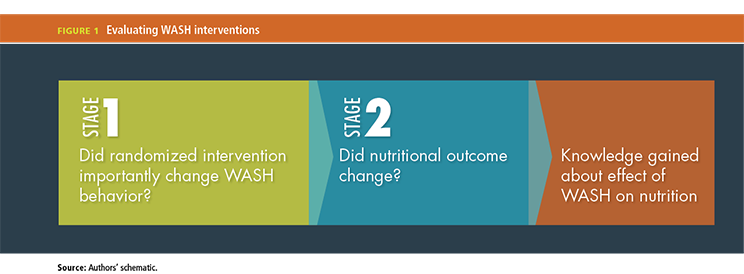The following post by IFPRI senior research fellow Lawrence Haddad shares highlights from Chapter 3 of the 2014-2015 Global Food Policy Report, which Haddad co-authored withDean Spears, Director of R.I.C.E. and visiting economist at the Centre for Development Economics, Delhi School of Economics, India. The post originally appeared on theDevelopment Horizons blog.
This week saw the launch of IFPRI’s 2014-2015 Global Food Policy Report.
Dean Spears and I have a chapter in it on sanitation and nutrition (actually, Dean did most of the work).
The paper looks at the links between WASH (mostly sanitation) and nutrition through different types of evidence, research implications and implications for policy.
- Observational evidence: Noting (among other things) that kids in West Bengal, just across the border from Bangladesh, come from higher income households than their Bangladeshi counterparts but have lower height for age scores. We cite evidence that suggests (it is observational after all) the rapid decline in open defecation in Bangladesh (from 34% in 1990 to 2.5% in 2012) has something to do with the fairly rapid decline in stunting in Bangladesh.
- Impact evaluations: Here we note, with the exception of a study in Mali, that sanitation interventions have not shown much impact on child stunting (or other nutrition status outcomes). The main reason is that the interventions were not effective in changing behaviour around open defecation. No change in behaviour, no change in nutrition status. So we need to design better interventions.
This is the challenging first stage of WASH interventions (see below).
- Research priorities: These include, obviously, research that will help construct interventions that will change WASH behaviours. Simply providing household toilets is not sufficient and in some case may not even be necessary (communal might be OK). Behaviour change in this domain (pretty much like in most domains) is complex and varied partly because it is so wrapped up in diverse cultural norms.
- Policy implications: First, invest in (and evaluate) pilots that attempt to change behaviours around open defecation and other practices that we think negatively affects nutrition status.Second, be careful in wanting to make WASH nutrition sensitive. It may help WASH become more effective at reducing nutrition by emphasising the consequences of current WASH behaviours, but it might also overload frontline workers and the bureaucracies behind (or on top of) them.







